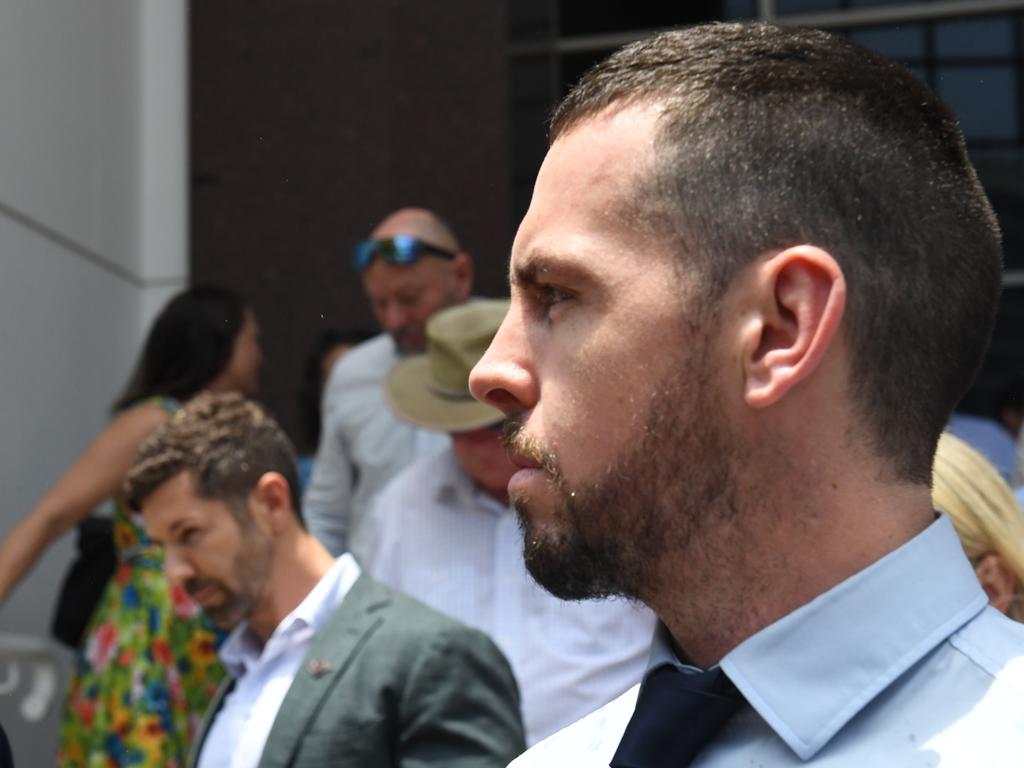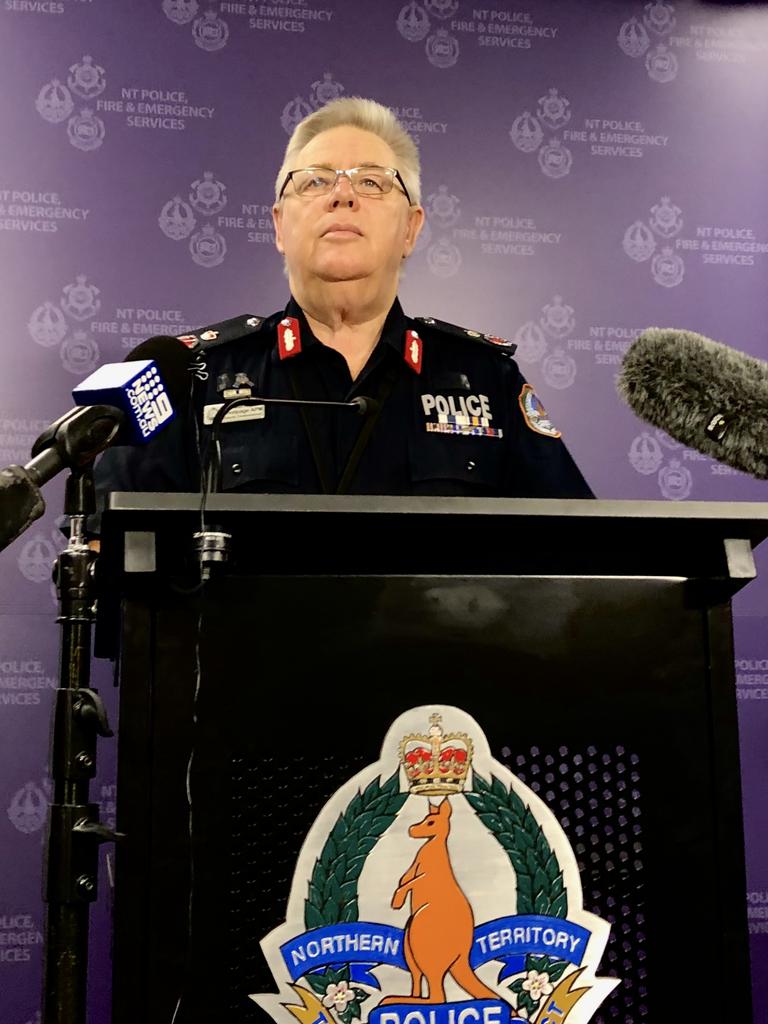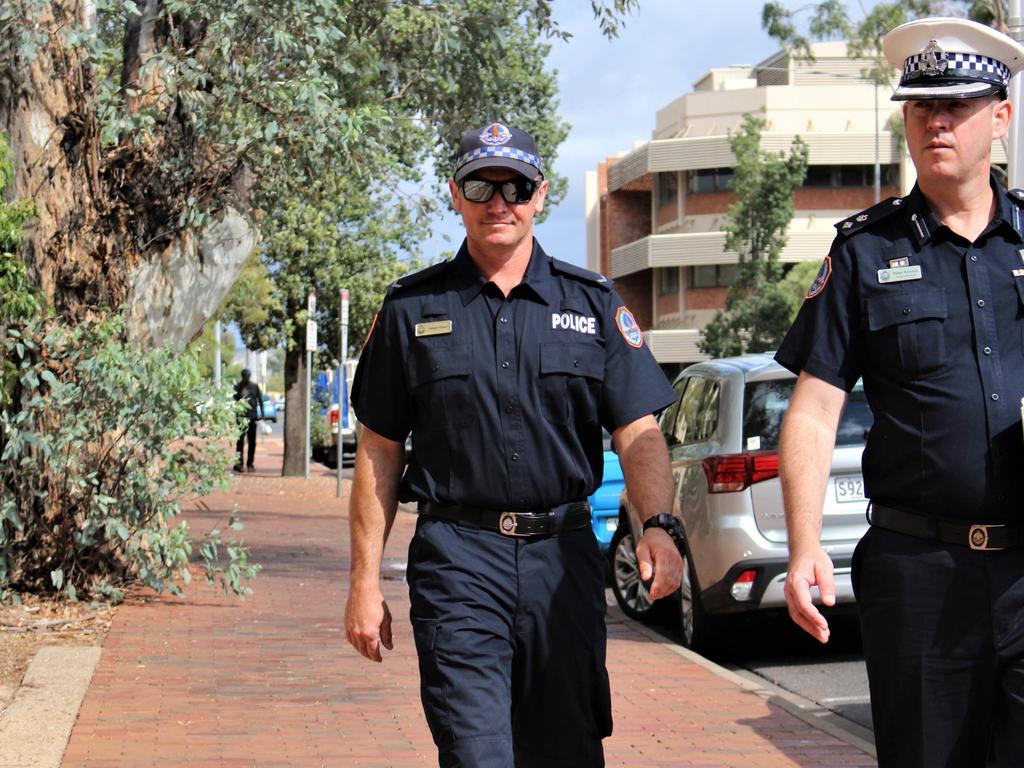Zach Rolfe was banned from Queensland Police for ‘violent behaviour’ prior to Kumanjayi Walker shooting: Court
The man who killed Kumanjayi Walker had an above average ‘aggression score’ in psychological testing and was rejected by Qld police before joining NT Police, a court has heard.
Northern Territory
Don't miss out on the headlines from Northern Territory. Followed categories will be added to My News.
Zach Rolfe was banned from applying to join the Queensland police force for 10 years after failing to disclose a fine for “violent behaviour” and had also previously pleaded guilty to theft while serving in the Australian Defence Force, a court has heard.
A written decision on the admissibility of evidence in the ongoing Coronial inquest into the death of Kumanjayi Walker, published on Tuesday, has also revealed psychological testing showed Constable Rolfe had an above average “aggression score”.
Constable Rolfe was acquitted on all charges by a Supreme Court jury in March after fatally shooting the 19-year-old Warlpiri man during a bungled arrest in Yuendumu in 2019.
In her ruling, Territory Coroner Elisabeth Armitage said the evidence challenged by Constable Rolfe’s legal team, “suggests that Constable Rolfe did not provide accurate information to the Police force during his recruitment process”.
Ms Armitage said in his written application to join the NT Police, Constable Rolfe had denied he had ever been the subject of any complaints, internal investigations or disciplinary action.
“The impugned evidence suggests, however, that while a soldier in the Australian Defence Force in 2012, Constable Rolfe had been the subject of an internal military investigation as a result of which he had pleaded guilty, at a military trial, to a charge of theft,” she wrote.
“In his written application to the (NT) Police force, Constable Rolfe did not disclose a fine he had received in Queensland for ‘public nuisance – violent behaviour’.
“On the other hand, Constable Rolfe disclosed this matter during his oral interview.”

As a result of a similar failure to declare the fine in an application to join the Queensland police, Ms Armitage said he was informed “that the failure to disclose this matter was an integrity breach and that he was excluded from reapplying for the Queensland Police Service for 10 years”.
As part of the recruitment process for joining the NT Police, Ms Armitage said Constable Rolfe had undertaken psychological testing with the Australian Institute of Forensic Psychologists.
While he was “otherwise found to be an ‘excellent’ candidate”, she said the resulting report found that “after making a mistake, Zachary is less likely than many others to accept responsibility”.
“He may brush off the significance of the error, seek to minimise his own role, or to blame others,” it found.
“The ‘Aggression’ score is above average. Whether Zachary will act with firm assertiveness or frank aggression cannot be determined from this scale alone.”
Ms Armitage said the report also found that “friction between Constable Rolfe and his father, Richard Rolfe”, was a pattern that “has frequently (been) found to be associated with later resentment of authority figures in highly structured organisations in which employees are expected to comply with strict procedures”.
“In the present case, other data confirm this could be a problem,” the report concluded.
In ruling the evidence admissible, Ms Armitage said a series of expert reports “may suggest that more robust recruitment processes would have disclosed ‘disentitling … pathology or attitudes suggestive of (Constable Rolfe’s) unsuitability’ for employment as a police officer that contributed to Kumanjayi Walker’s death”.
“At this stage that is not a matter that is possible to determine,” she wrote.
“Quite apart from the issue of the adequacy of the relevant Northern Territory Police recruitment processes, the impugned evidence may raise questions about the adequacy of the ongoing supervision and assessment Constable Rolfe received after he commenced as police officer.

“In particular, his supervision and assessment in or around 9 November 2019, including the assessment that he was suitable for deployment to Yuendumu with the IRT on that day.”
Ms Armitage said Deputy Commissioner Murray Smalpage had noted in his affidavit that ‘while initial assessment processes must be rigorous, they need to be supplemented by ongoing assessments”.
“(That is because) in spite of all the checks and balances that are conducted during the recruitment process, it is possible that unsuitable applicants may still be offered employment if they deliberately obscure disentitling conduct or pathology or attitudes suggestive of their unsuitability,” he wrote.
Earlier, the court heard Constable Rolfe had told colleagues any investigation into Mr Walker’s death “would be over in no time” at a social gathering in the days following the shooting.
Constable Rolfe was acquitted on all charges by a Supreme Court jury in March before the three month inquest began in the Alice Springs Local Court last month.
On Monday, the other officer directly involved in Mr Walker’s bungled arrest, Adam Eberl, testified that he had understood there was a debriefing planned at the Alice Springs police station in the days after the shooting.
“I thought it was a bit of a debrief, a bit of a chat about how things were and how are you going,” he said.
But Constable Eberl said “what I thought was going to be a debrief wasn’t really a debrief”, and instead became a barbecue at Constable Rolfe’s house, involving the officers present in Yuendumu and others.
“It was changed, I think, to Zach’s house, (we) went around for a barbecue and had a bit of a chat,” he said.
“Just about general things, I tried to mention and talk about the incident but (Sergeant) Shane McCormack said ‘No, no, don’t talk about it’.”

In questioning Constable Eberl, Counsel assisting the Coroner, Peggy Dwyer, read from the police statement of another officer present at the barbecue but who was not deployed to Yuendumu, Breanna Bonney.
“She says this, that there was a discussion about use of force, the training that we all receive in terms of use of force, other similar incidents that have happened in the past,” she said.
“And we were all kind of having that conversation under the premise that Zach, at the fact of it, had adhered to our training, that edged weapon equals gun, and we all thought he’d be back at work within the week.”
But Constable Eberl said he did not remember any discussion of use of force, edged weapons or “the fact that, really, what Zach had done was justified”.
“The only thing I can remember, there was some talk about Zach thought it would be over in no time,” he said.
Constable Eberl said he expected there would be “a full and thorough investigation” whenever there was a use of force by police that resulted in a loss of life.
“Obviously someone had died, so there’d be a Coronial and all sorts of things,” he said.
Constable Eberl said he was unaware at the time of a protocol following deaths in custody that dictated that officers should be separated to avoid their evidence becoming contaminated and was never given a direction to avoid Constable Rolfe.
“If you had been would you have gone to that barbecue and discussed matters in relation to what had occurred?” Dr Dwyer asked.
“No, I wouldn’t,” Constable Eberl replied.
“And probably me and Anthony Hawkings wouldn’t be patrolling around the rear of the (Yuendumu) police station together either, it could have been separated a lot earlier and dealt with.”
The inquest continues.
More Coverage
Originally published as Zach Rolfe was banned from Queensland Police for ‘violent behaviour’ prior to Kumanjayi Walker shooting: Court









